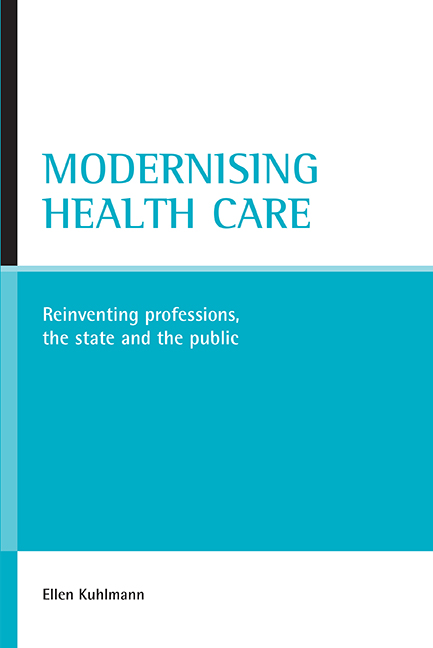Book contents
- Frontmatter
- Contents
- List of tables and figures
- Acknowledgements
- Abbreviations
- Glossary
- Introduction
- one Towards ‘citizen professionals’: contextualising professions and the state
- Part I Mapping change in comparative perspective
- Part II Dynamics of new governance in the German health system
- Part III The rise of a new professionalism in late modernity
- References
- Appendix: Research design of the empirical in-depth study
- Index
- Also available from The Policy Press
nine - The knowledge–power knot in professionalism: transforming the ‘currency of competition’
Published online by Cambridge University Press: 15 January 2022
- Frontmatter
- Contents
- List of tables and figures
- Acknowledgements
- Abbreviations
- Glossary
- Introduction
- one Towards ‘citizen professionals’: contextualising professions and the state
- Part I Mapping change in comparative perspective
- Part II Dynamics of new governance in the German health system
- Part III The rise of a new professionalism in late modernity
- References
- Appendix: Research design of the empirical in-depth study
- Index
- Also available from The Policy Press
Summary
Knowledge is the key to professional power and the ‘currency of competition’ in the service sector. New models of governance that attempt to standardise knowledge and include user perspectives thus touch the core of professional power. This chapter contextualises the making of legitimate knowledge and outlines the conditions and options for a loosening of the knowledge–power knot of professionalism. I introduce a dynamic approach that moves beyond state control and market regulation, and links the approaches on knowledge and professionalism as a resource for occupational control with the social construction of knowledge. The findings of the study highlight that the new models of standardising and monitoring knowledge challenge – but do not necessarily threaten – professional power. Moreover, they open up new options for the medical profession to legitimise knowledge and power, and hereby challenge health policies that attempt to improve the control of providers. Bringing together different approaches and empirical findings reveals evidence of a diversity of knowledge and a more empowering potential of standardisation, but also of an increasing ‘rationalisation’ that serves to reassure medical power under changing conditions of marketisation and consumerism.
Challenging the alliance of knowledge, power and professionalism
A body of esoteric knowledge and a formalised expert knowledge system are key issues in studying the professions (Parsons, 1949; Freidson, 1986; Thorstendahl and Burrage, 1990). However, new forms of regulating the health professions and ‘managing’ the making of legitimate knowledge necessitate further investigation of the alliance between knowledge and professional power. Linking the approaches on knowledge as a resource for occupational control with the social construction and feminist theorising of knowledge, provides deeper insights into the ambivalence of formalised codes of knowledge and the tensions between professions, the state and the public.
Current changes provoked by consumerism and ‘scientific-bureaucratic medicine’ (Harrison, 1998) are key issues to assess the power and transformability of professional knowledge. Flynn argues that “the intermediate concepts of soft bureaucracy and encoded knowledge” are useful to understand the nature of organisational control in health care (2004, p 24). However, my empirical findings indicate that these concepts must be linked to the actors who apply and transform the new regulatory tools in different ways, as well as to the institutional contexts that shape these options.
- Type
- Chapter
- Information
- Modernising Health CareReinventing Professions, the State and the Public, pp. 199 - 218Publisher: Bristol University PressPrint publication year: 2006



